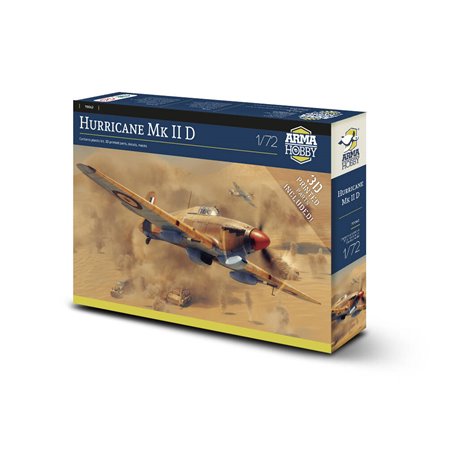No products
Product successfully added to your shopping cart
There are 0 items in your cart. There is 1 item in your cart.
Hawker Hurricane Mk.IID - 1/72 scale
AH70062
Arma Hobby
Hurricane IID kit 1/72 scale. Includes 3D printed parts
In stock
| Scale | 1:72 scale |
| Material | Plastic |
| Assembly | Kit |
| Finish | Unpainted |
More info
Set contains:
- Plastic parts (Mk IIc)
- Conversion - 3D printed cannons, exhaust manifold, mirror, template for scribing panel on wings.
- Canopy and wheel masks
- Decals with 5 colour schemes
Markings options:
- BP158/JV-I, No. 6 Squadron RAF, airfields: Shandur and L.G. 89, Egypt, autumn 1942.
- KW704/R „Christine", No. 6 Squadron RAF, Gabes, Tunisia, April 1943. Pilot F/O A.H.M. Clarke.
- HW721/BR-J, No. 184 Squadron RAF, Colerne, England, spring 1943. Pilot S/Ldr Jack Rose. Aeroplane funded by Woolwich Aircraft Fund.
- KX229/H "Cheeta", No. 20 Squadron RAF, Nidania, Burma, February 1944.
- HW874/X, No. 20 Squadron RAF, Monywa, Burma, spring 1945.
Hurricane Mk II D
The Mk.IID was the most specialised Hurricane variant to enter series production, around 300 being made. Armed with two 40mm Vickers 'S' guns and a pair of 0.303 guns loaded with tracer for sighting. The 40mm guns had 15 shells in each magazine, plus shell could be loaded into the gun giving 16.
The guns were set to be harmonised at 400 yards, and to be fired at 240 m.p.h, flying at a very low level, 20 to 40 feet, firing 2 or 3 shots each attack pass. The aircraft speed is added to the shells velocity, increasing armour piercing capability. The 40 mm guns could not be jettisoned. They proved to be very accurate once pilots were trained in their use.
Making its debut in 1942 with No. 6 Squadron in North Africa, who came to enjoy the nickname, The Flying Tin Openers, with a badge to match (see decals of BP158).
The IID was also used by 7 Sq. SAAF in North Africa, 184 and 164 Sq's in the UK which were used in cross channel sweeps against ground targets and shipping, and in Burma by 5 and 20 Sq's.
While the IID was effective, it was also vulnerable, and later production examples included the same armour fitted to the Mk.IV.
It was also limited as it could only carry the 40mm guns, but the success in the anti-tank role led to the development of the Mk.IV, with a universal armament wing, capable of carrying the 40mm guns, but rockets, bombs and drop tanks, making a much more versatile type, and added internal and external armour, replacing the IID in service, though units did use both together. The last Mk.IID and Mk.IV were built at the same time, possibly to use up already made D wings.
With the availability of the Mk.IV, most of the later IID's went to the Soviet Union who received 60, the other surviving IID's ended






